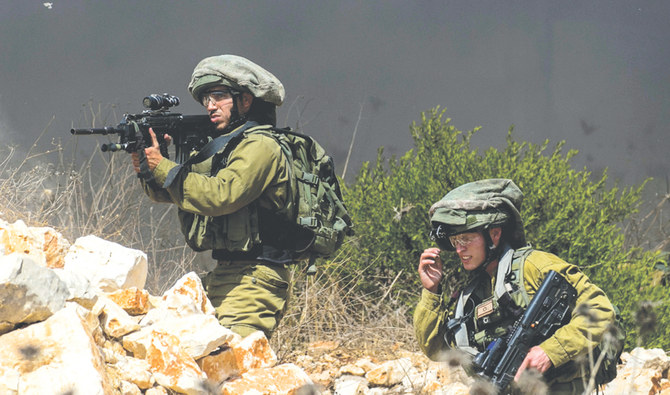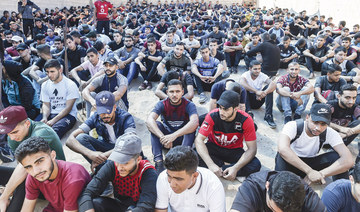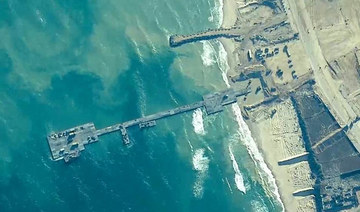GAZA CITY: Ahmed Abu Artima was one of the founders of the “Great March of Return,” the weekly protests along Gaza’s frontier with Israel meant to draw attention to the plight of the territory’s 2 million people. But these days, he mostly avoids the demonstrations. He is among a growing number of Gazans who believe the protests have lost their way. With little to show from 18 months of demonstrations beyond the hundreds of people killed or wounded by Israeli fire, many Gazans are beginning to question and even criticize the Hamas-led protests, a rarity in a territory where dissent is barely tolerated by the ruling group.
For several months now, Abu Artima has organized his own alternative protest. On a recent Wednesday, dozens of Palestinians gathered near the separation fence between Israel and Gaza, performing traditional dances and ballads between poem recitals and speeches by local community leaders. Children gathered around two camels decorated with embroidered saddles.
Abu Artima’s eyes sparkled as he watched. This is the kind of demonstration he envisioned when he and other young grassroots activists came up with the idea of building mass encampments along the fortified frontier. He calls it a protest that “tries to deliver our message as safely as possible.”
Held every two weeks, these events are in dramatic contrast to the main Friday protests.
Friday rallies
Directed by a committee comprising Hamas and other Gaza groups, the Friday demonstrations are held against a backdrop of black smoke from burning tires. Protesters hurl rocks at Israeli troops, who respond with clouds of tear gas and gunfire. Ambulances scream back and forth, ferrying the wounded to field clinics and hospitals.
When the protests began, Hamas quickly seized upon the popular idea and transformed the quiet gatherings into violent confrontations.
Under its direction, thousands of Palestinians have gathered at five sections of the fence each week, facing off against Israeli forces perched on earth mounds and in sniper positions.
The Israeli troops fire live shots, rubber-covered steel pellets and tear gas, in what Israel says is a legitimate tactic to defend against attacks and border infiltrations.
Hamas says the violent protests, which are still attended by a few thousand people every Friday, are meant to force Israel to ease its crippling blockade. But the demonstrations have done little to improve conditions in Gaza, and have come at a high human cost.
The Gaza-based Al-Mezan Center for Human Rights says 211 Palestinian protesters, most of them unarmed, have been shot dead during the demonstrations, including 46 under the age of 18. More than 18,000 have been wounded. The Health Ministry says 124 had amputations in lower limbs. One Israeli soldier has also been killed.
With Hamas dedicating this week’s protest to “child martyrs,” UN Humanitarian Coordinator Jamie McGoldrick urged both sides to protect children. “Boys and girls must never be targeted, put at risk or encouraged to participate in violence,” he said.
NUMBER
211 - Palestinian protesters, most of them unarmed, have been shot dead during the demonstrations, including 46 under the age of 18. More than 18,000 have been wounded. The Health Ministry says 124 had amputations in lower limbs.
Calling his event “The Return Journeys,” Abu Artima says he is focused on his original idea of highlighting the desire of Palestinian refugees and their descendants to return to the lands they fled or were forced from during the 1948 war surrounding Israel’s establishment. Some two-thirds of Gaza’s population are refugees.
“We want to present a model for the people that we can send our voice by art and national songs,” he said. “Our presence here even without direct confrontation is a message of determination.”
While the “right of return” was the original message of the demonstrations, Hamas quickly turned the focus to the 12-year-old blockade imposed by Israel and Egypt after it seized control of Gaza in 2007.
The blockade has devastated Gaza’s economy and caused the unemployment rate to skyrocket to over 50 percent. Israel says the closure is needed to prevent Hamas from arming.
Leverage
Hamas views the protests as a key form of leverage in getting the closures lifted, so it urges maximum participation. On days before protests, vehicles with loudspeakers mounted on their roofs tour Gaza streets and mosques urging families to head to the fence. On Friday, buses pick up participants from across the strip.
There have also been calls to storm the frontier. In May 2018, as the US was opening its embassy in Jerusalem after relocating it from Tel Aviv, more than 55 Palestinians were killed in a single day as tens of thousands protested amid Hamas calls to cross into Israel.
To prevent what could have been a fourth war in a decade between Hamas and Israel, mediators rushed to contain the protests. Under an unofficial Egyptian-brokered truce, Hamas scaled down the marches in recent months while Qatar delivered cash infusions for Hamas’ civil servants and welfare programs. UN-sponsored job creation programs were also envisioned.
Hamas scaled back the protests, triggering more accusations that it was acting for its own interests. Critics include scores of people who were shot in the legs. In Gaza’s overwhelmed medical system, such cases often end with amputations.
In a video circulated in August, a father scolded his wounded son at a hospital for going to the protests and accused doctors of not providing proper medical care for the teenage boy.
Hamas officials also came under fire after a press photo went viral showing rows of amputees at a Hamas event, each waiting for a $50 welfare payment.

























